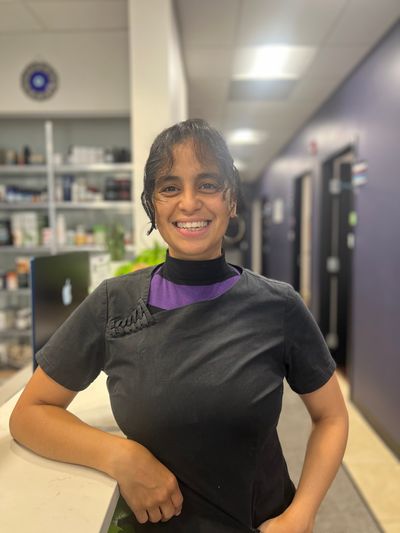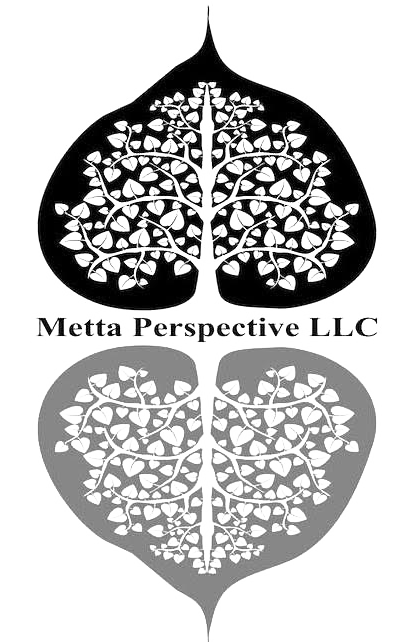About Dr. El Helo
Meet Dr. Kholood

Kholood on Bridging Divides and Listening to your Gut
By the time Dr. Dawn opened Metta, saying yes to the Care Coordinator position was a no brainer for Kholood. As the Care Coordinator, one of Kholood’s favorite parts of working at Metta is the range of cutting edge technology that Dr. Dawn integrates into the clinic to best support her patients.
Prior to working at Metta, Kholood sought a breadth of knowledge through education, making her an exceptionally qualified professional. She began her career as a Registered Nurse after earning her Associate’s Degree from the City Colleges of Chicago. She then completed a Bachelor of Science in Biology at Northeastern Illinois University before shifting her focus to Eastern medicine. Kholood went on to graduate school, completing a Master of Science in Traditional Oriental Medicine with a focus on acupuncture and herbalism, and later finished coursework for a Doctor of Acupuncture and Chinese Medicine at Pacific College. Kholood is a certified acupuncturist and herbalist.
When asked about what drew her to incorporating both Western and Eastern medicine in her career she shared, “I remember my dad used to talk a lot about his mom and his grandparents using herbs and plants to heal so that was always something that I grew up with…My undergrad is in biology and the sciences so I went into nursing, because it's kind of like a broad scope of dealing with all of the clinicians and actually having front and center patient care.”
She went on to share more about what inspired her transition from nursing to Eastern medicine. “I'm very hands on. So that was my reason for going into nursing and to really just kind of hone in and see what it's like in the allopathic setting. Very eye opening, and I definitely learned a lot. But I ended up going into Eastern Medicine because I felt like in nursing there was only so much I could do. And felt like I wanted to learn more to really help patients…gain control of their health and not just when they're already ill, but preventive medicine as well.”
Kholood’s desire to help patients on a new level inspired her to seek out further learning. She explained, “I did my research to find out where in America can we get Eastern training? And that's how I stumbled upon Pacific College. One of the main reasons why I picked that school was because of their extensive herbal pharmacy.” In addition to studying herbalism, Kholood also received a Doctorate in Acupuncture and a Master of Science in Oriental Medicine from Pacific College.
Kholood’s extensive background in Eastern and Western medicine gives her a unique perspective on the benefits of acupuncture. In Western health systems, medicine is often used to solve the symptom of a problem while Eastern medicine focuses on recalibrating the body and helping create a sense of balance by addressing the root cause of a recurring symptom. She shared, “A lot of times, we in western society think of the body as just this machine that can just keep going, and we just add the same fuel. But sometimes that fuel is really not fuel, and we're kind of running on an empty gas tank…” She continued, “The way, doctor Dawn treats here at Metta Perspective is very science based. It's all about the electrons. It's about making sure that we get those nutrients, the fuel, the electrons, the QI, the blood, in top shape, or even just replenishing and continually recharging the body. Because our lifestyle here is very, I would say, conducive to burnout.”
Throughout her career, Kholood has also developed a specific focus on pain management, gastrointestinal health, and emotional health because they are deeply interconnected. On explaining the focus of these areas in her work Kholood shared, “A lot of times, people don't equate each issue, illness, [or] dysfunction that they're getting as the same issue. They usually compartmentalize it into one or the other. So I honed in on those three specifics as connected. A lot of times, where a disease ends is not where it starts.”
She continued to explain the important role of gut health in our overall health. “In my opinion, the epitome of our health really starts in the gut. Seventy five percent of our immune system is in the gut, but also our nervous system. We hear a lot about the gut brain connection and it's really true. It's our intuition. It's our center. It's also where we process emotional stuff, mental stuff. It's also where we process our physical food. And so all those things, if they're optimal, will fuel and make the proper nutrients to kind of keep us in balance.”
Kholood went on to explain signs of imbalance that can be noted by the health of our gut. “A lot of times, if we have an emotional disturbance; that can disrupt the actual physiological function of digestion. And so things will kind of cascade into the nervous system, and then we start to get anxiety. Then when we get anxiety, we tense up. And then when we tense up, we start to get pain. And so all of it goes back to what happened first. You can't treat one without the other, and this is why those are my big focus.”
In terms of the future, Kholood looks forward to the possibility of Western practitioners and Eastern practitioners working together. She shared “Especially [in] acupuncture, I definitely would love to see more continuity of care. We get a lot of patients who already have their set Western physicians which is great because that helps us gauge where they're at. But then what I'd like to see is more of a community… Having that camaraderie where we can communicate with the Western clinicians in regards to their patient.” She shared more about why increased connection and continuity between Western and Eastern practitioners in the future could be impactful. “That would be a holistic type of care for [the patients]. And that has always been my vision as a Western practitioner as well integrating Western and Eastern. And I know that they're two completely different modalities but getting into the heart of being able to communicate between both modalities is something that can definitely benefit the patient one hundred percent.”
